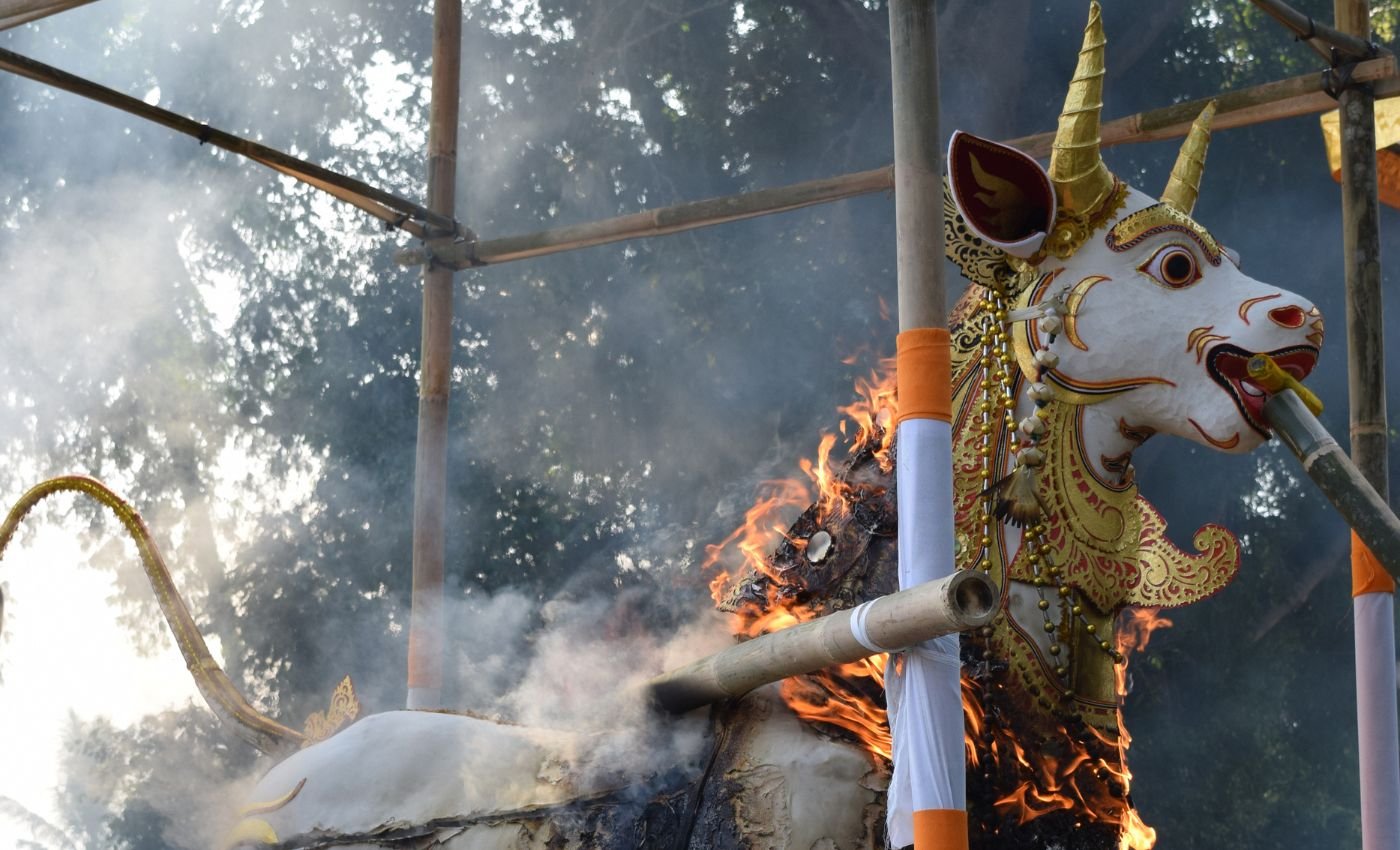
Ngaben Ceremony: How to Witness Bali’s Sacred Cremation Ritual
When we travel, we’re always open to the unknown, to some extent. One of the best things about exploring new places is when our journeys are graced with unexpected surprises.
While scootering through Ubud, Bali, I found myself swept into an incredible Ngaben ceremony—a beautiful, joyous Balinese funeral celebration of both life and death. It was unlike anything I’d ever experienced, and I knew this would be a story I’d carry with me forever.
In this post, I’ll share the unexpected way I stumbled upon a Ngaben ceremony. More importantly, I’ll explain how you can experience this incredible cultural event during your trip to Bali. Whether it’s by chance, as it was for me, or through planning and connecting with locals, experiencing a Ngaben ceremony offers a unique glimpse into Bali’s rich spiritual traditions. Let’s dive in!
This post contains affiliate links. If you make a purchase through these, I may earn a small commission at no extra cost to you, which helps me keep this blog running. Thanks for your support 🙂
Table of Contents
ToggleWhat is a Ngaben Ceremony?
First things first—what does Ngaben exactly mean? In local culture, Ngaben means ‘turning into ash’, and it is a cremation ceremony in Bali that symbolises the release of the soul from the body, allowing it to transition to the afterlife and prepare for reincarnation. Rather than a somber event, it’s a joyous Balinese ceremony, a celebration of life and death, marking the soul’s journey towards spiritual purification. This ritual is deeply rooted in Balinese Hinduism and is one of the most important ceremonies in Bali, reflecting the island’s vibrant culture and deep spirituality.

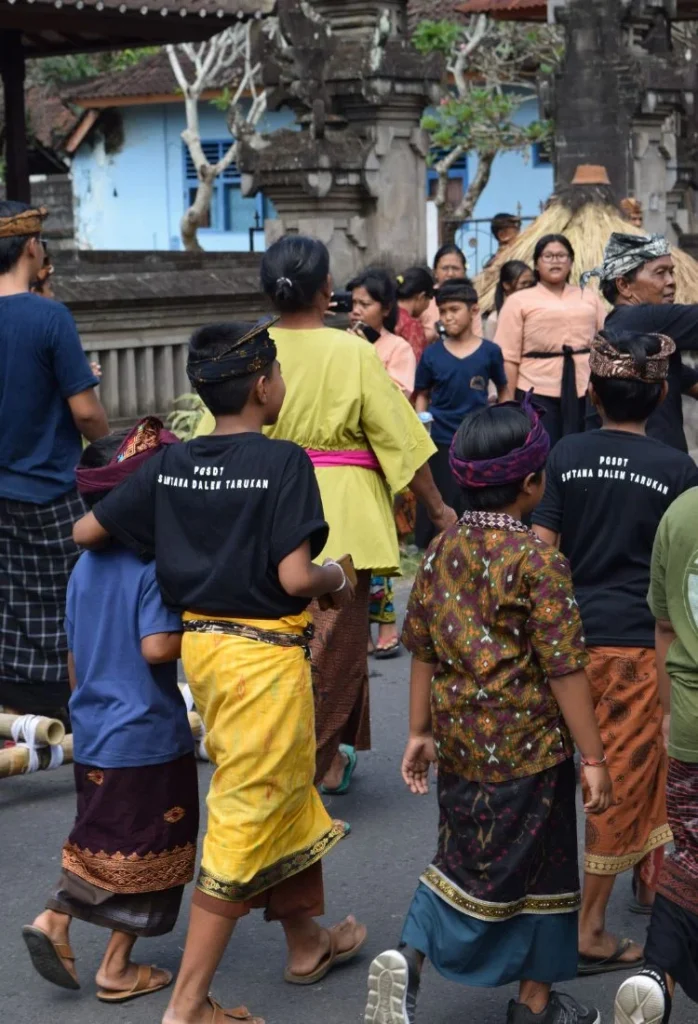
How I Stumbled Upon a Ngaben Ceremony
It all started on a regular sunny day in Ubud. My plan was simple—rent a motorbike and head to the famous rice fields. A motorbike seemed like the perfect way to zip through the streets and take in the sights (as anyone who’s been to Bali knows, renting a scooter is pretty much a tourist rite of passage).
So there I was, zooming down the road, when suddenly—traffic jam! But not your usual kind. The street was packed with people. Walking. Everywhere. Human traffic took over the road, and I had no choice but to slow down and weave through the sea of bodies, wondering what on earth was going on.
After a few minutes of snail-speed scootering, curiosity got the better of me. I pulled over and asked a local what the occasion was. “Today is an important day for our village” they replied, smiling. Turns out, I had stumbled upon a Balinese funeral! But this wasn’t just any funeral—it was a Ngaben ceremony, a Balinese cremation ritual that’s not only steeped in tradition but also filled with celebration and joy.
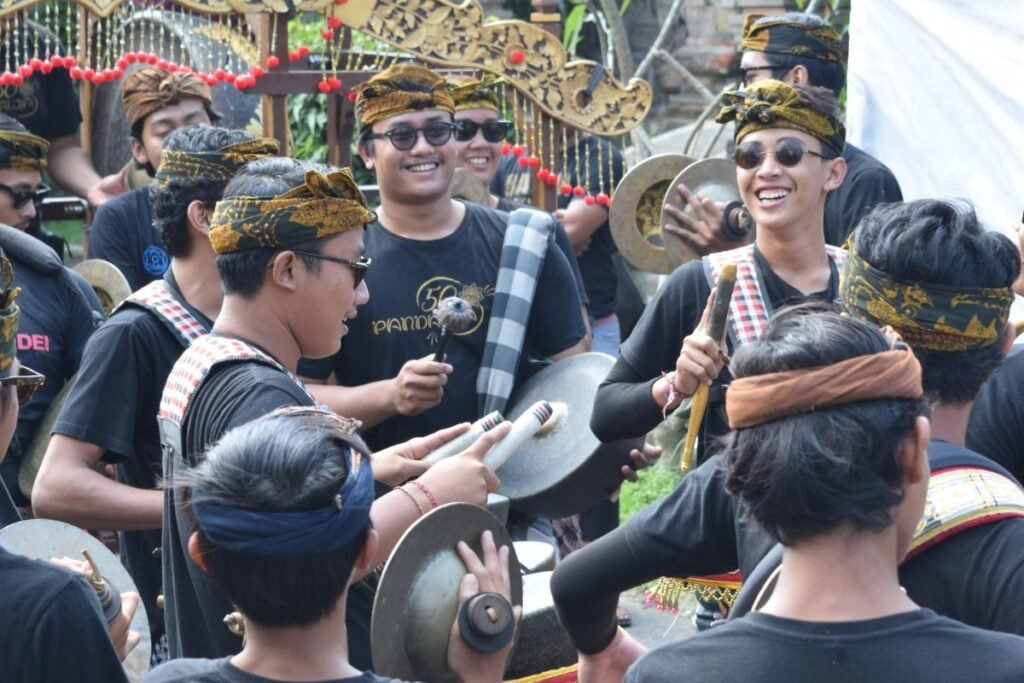
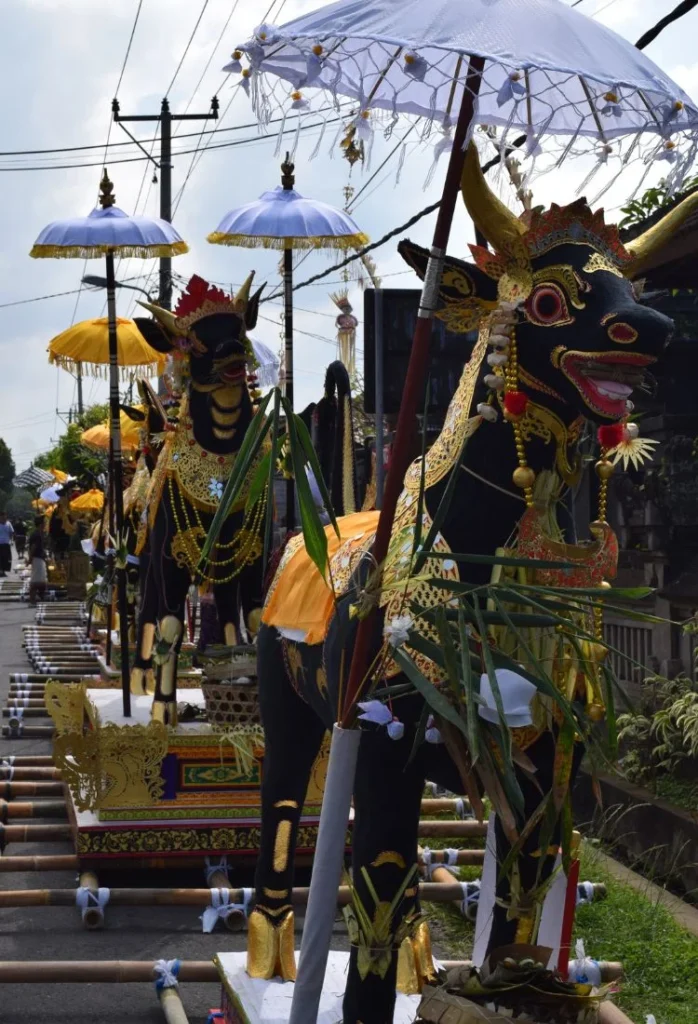
Following the Procession: From Festive Streets to the Sacred Ritual
Now, I know what you’re thinking—funerals? Joyful? In the West, we’d never imagine laughing or celebrating at a funeral, especially for someone we’d never met. But in Balinese Hinduism, death is seen as a new beginning. The soul is freed from the body and embarks on its journey towards the afterlife, preparing for reincarnation. Rather than a time for mourning, it’s a celebration of the soul’s transition, and the vibe reflects that.
Curiosity piqued, I decided the rice fields could wait. I parked my scooter and followed the crowd to the starting point of the ceremony. The atmosphere was electric. People were dressed in traditional clothes, music filled the air, and the streets were covered with garlands, flowers, and offerings. But the centerpiece? Huge, intricate structures representing animals like bulls and oxen—called Lembus—were being carried by groups of men. Each sarcophagus, shaped like a black bull, held the body of a loved one waiting to be cremated.
It didn’t take long to get swept up in the excitement. At the front of the procession, the Lembu sarcophagus moved through the streets, with kids perched on top for a ride, grinning from ear to ear. I was told the cremation would take place at a nearby temple, so naturally, I hopped back on my motorbike and headed there, eager to see what was next.
When I arrived, the scene was unlike anything I’d ever seen. Multiple Lembus were lined up, each representing a soul ready for its final journey. Women carried offerings and photos of their loved ones, and the energy was somehow both solemn and celebratory. As a priest sprinkled holy water and made final offerings, I couldn’t help but feel a deep sense of respect for the cultural and spiritual significance of what I was witnessing.
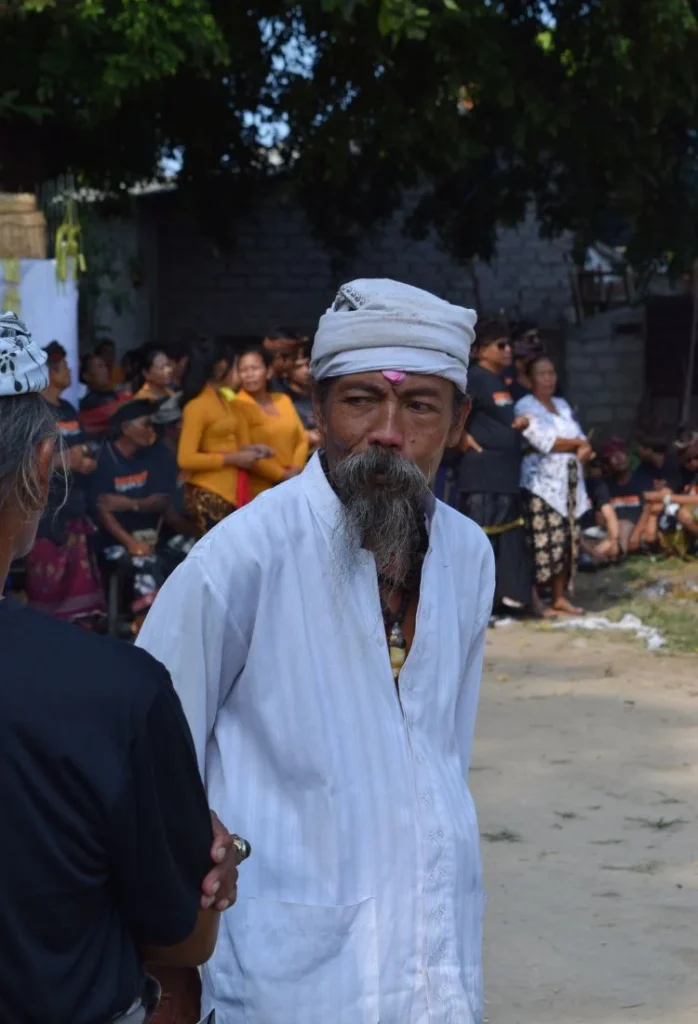
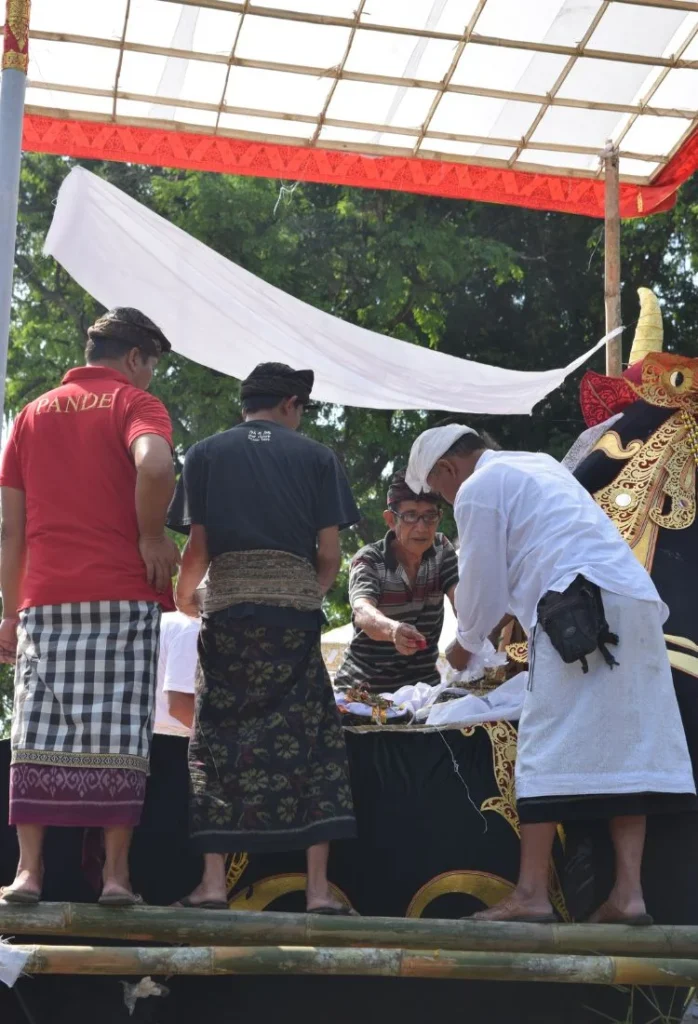
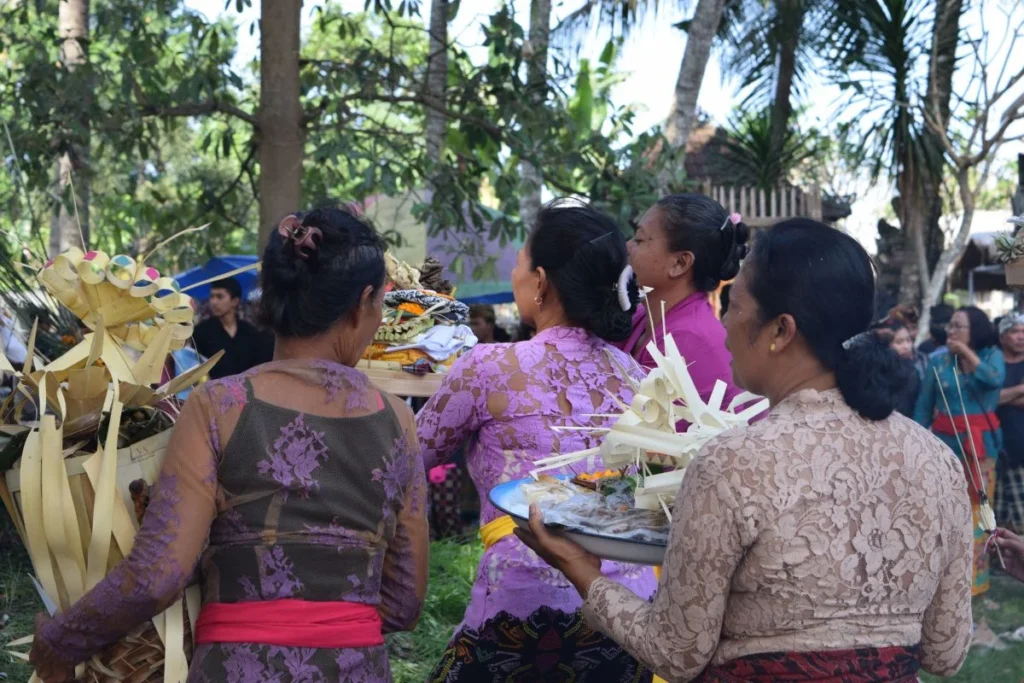
Then came the moment everyone had been waiting for—the actual cremation. As the structures were set ablaze, Balinese musicians played beleganjur music, a powerful soundtrack to the soul’s struggle against malevolent forces as it ascends to heaven. The fire engulfed the bulls, and in a matter of moments, the bodies within were consumed by the flames, their souls set free.
Watching it all unfold, I felt incredibly grateful to have stumbled upon such a moving, profound moment. It’s one thing to witness a cultural ceremony from afar, but to be there, surrounded by the community, fully immersed in their traditions? That’s a travel experience that stays with you forever.
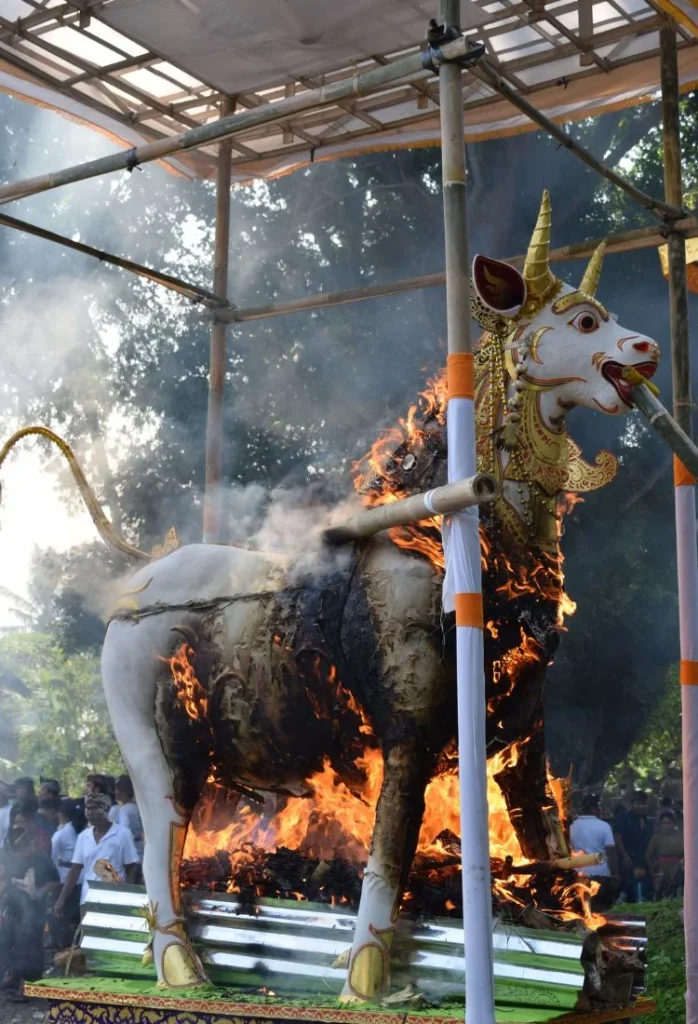
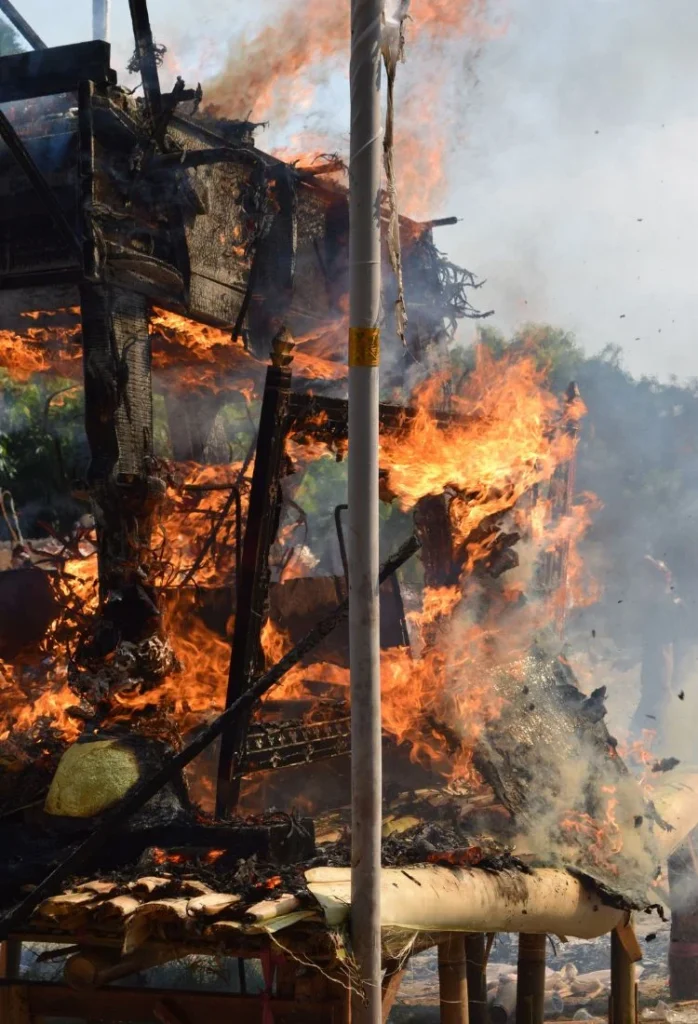
What Happens After the Cremation?
Once the fire has died down, the family gathers the ashes and any remaining bones. These are carefully wrapped in a white cloth or placed in a container made from a yellow coconut. In a more intimate ceremony, attended by close family and friends, the ashes are taken to the nearest sea. According to Balinese Hindu belief, scattering the ashes in the ocean allows the spirit to return to heaven, where it begins the cycle of reincarnation once again.

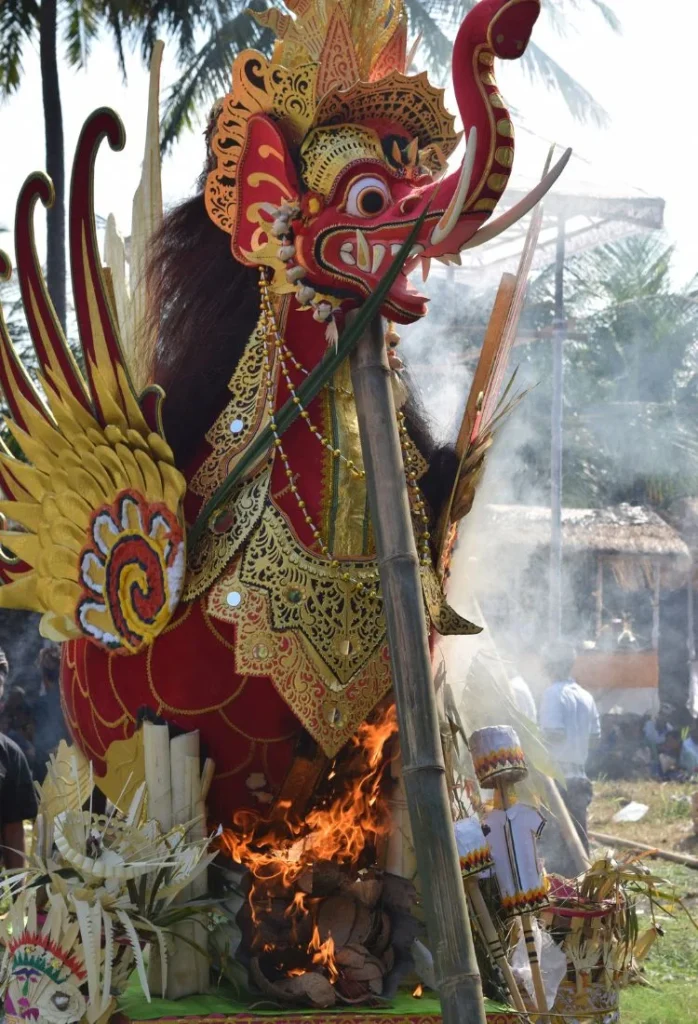
How to Experience a Ngaben Ceremony
Unlike a temple visit or a cultural dance performance, a cremation ceremony in Bali of this kind doesn’t have a set schedule. Since the ritual involves extensive preparation, it can take weeks, months, or even years before a person’s cremation takes place. However, there are ways to increase your chances of attending one during your time in Bali:
- Ask the Locals: Balinese people are incredibly friendly and welcoming. If you’re staying in Ubud, strike up a conversation with the locals or your homestay hosts. They’ll often know when a ceremony is taking place, and they might even invite you to join.
- Check Facebook Groups: There are several community groups dedicated to events and happenings in Bali. It’s not uncommon for Ngaben ceremonies to be mentioned, especially in rural areas around Ubud.
- Keep Your Eyes Open: Much like how I stumbled upon the ceremony, sometimes you just need to be aware of what’s happening around you. If you see a large procession of people in traditional clothes with garlands and decorated sarcophagi, chances are you’re witnessing the beginning of a Ngaben ceremony.
IMPORTANT: Balinese ceremonies often welcome respectful tourists; dress modestly and follow local advice to honour their traditions.
Where to Stay in Ubud?
Located in the heart of Bali, Ubud is the island’s spiritual and cultural hub, making it the perfect base for exploring the soul of Bali while escaping the busy crowds of Kuta. Beyond the captivating Ngaben ceremony, staying in Ubud provides easy access to a variety of attractions, from ancient temples and the famous Monkey Forest to lush jungle retreats and the iconic rice fields. Here are my top accommodation recommendations:
Luxury Option: Bisma Eight – This luxurious 5-star resort blends contemporary design with Balinese tradition, featuring stylish suites and spacious private pool villas. The property is surrounded by immaculate gardens and is ideally situated for exploring Ubud’s highlights, including the Monkey Forest. Guests can enjoy a stunning infinity pool, a tranquil spa, a well-equipped gym, and a high-end restaurant, all with breathtaking jungle views and indulgent touches like Japanese soaking tubs.
Budget Option: Yuni’s House – A delightful Balinese-style guesthouse nestled in the heart of Ubud’s art market. This serene hideaway offers warm hospitality, motorbike rentals, and a refreshing pool to unwind after a day of sightseeing. Its central location, just steps away from shops and major attractions, makes it an excellent budget-friendly choice.
Final Thoughts
Witnessing a Ngaben ceremony was unlike any other travel experience—deeply spiritual, culturally rich, and full of joy. What began as a chance encounter turned into an unforgettable glimpse into Balinese culture and their beliefs about life and death.
If you ever find yourself in Bali, especially in Ubud, I highly recommend making the effort to attend a Ngaben cremation ceremony. Not only will you gain a deeper appreciation for the Balinese way of life, but you’ll also be part of a rare, beautiful ritual that celebrates the cycle of life and the journey of the soul.



Leave a Reply